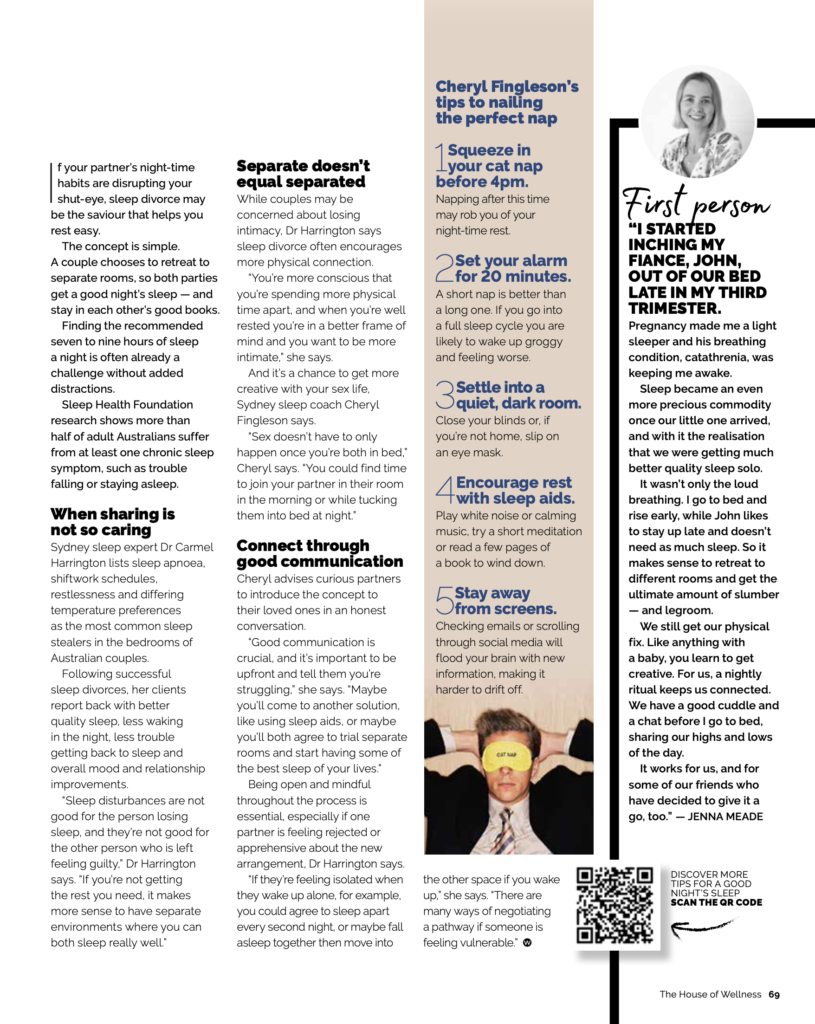Up all night due to your partner’s snoring, restlessness or conflicting bedtime schedule? Experts share why sleep divorce may be the slumber solution of your dreams.
If your partner’s night-time habits are disrupting your shut-eye, sleep divorce may be the saviour that helps you rest easy.
The concept is simple. A couple chooses to retreat to separate rooms, so both parties get a good night’s sleep — and stay in each other’s good books.

Finding the recommended seven to nine hours of sleep a night is often already a challenge without added distractions.
Sleep Health Foundation research shows more than half of adult Australians suffer from at least one chronic sleep symptom, such as trouble falling or staying asleep.
When sharing is not so caring
Sydney sleep expert Dr Carmel Harrington lists sleep apnoea, shiftwork schedules, restlessness and differing temperature preferences as the most common sleep stealers in the bedrooms of Australian couples.
Following successful sleep divorces, her clients report back with better quality sleep, less waking in the night, less trouble getting back to sleep and overall mood and relationship improvements.
“Sleep disturbances are not good for the person losing sleep, and they’re not good for the other person who is left feeling guilty,” Dr Harrington says. “If you’re not getting the rest you need, it makes more sense to have separate environments where you can both sleep really well.”
Separate doesn’t equal separated
While couples may be concerned about losing intimacy, Dr Harrington says sleep divorce often encourages more physical connection.
“You’re more conscious that you’re spending more physical time apart, and when you’re well rested you’re in a better frame of mind and you want to be more intimate,” she says.
And it’s a chance to get more creative with your sex life, Sydney sleep coach Cheryl Fingleson says.
“Sex doesn’t have to only happen once you’re both in bed,” Cheryl says. “You could find time to join your partner in their room in the morning or while tucking them into bed at night.”

Connect through good communication Cheryl advises curious partners to introduce the concept to their loved ones in an honest conversation.
“Good communication is crucial, and it’s important to be upfront and tell them you’re struggling,” she says. “Maybe you’ll come to another solution, like using sleep aids, or maybe you’ll both agree to trial separate rooms and start having some of the best sleep of your lives.”
Being open and mindful throughout the process is essential, especially if one partner is feeling rejected or apprehensive about the new arrangement, Dr Harrington says.
“If they’re feeling isolated when they wake up alone, for example, you could agree to sleep apart every second night, or maybe fall asleep together then move into the other space if you wake up,” she says. “There are many ways of negotiating a pathway if someone is feeling vulnerable.”
First Person: Our relationship thrives on sleep divorce.
“I starting inching my fiance, John, out of our bed late in my third trimester. Pregnancy made me a light sleeper and his breathing condition, catathrenia, was keeping me awake.
Sleep became an even more precious commodity once our little one arrived, and with it the realisation that we were getting much better quality sleep solo.
It wasn’t only the loud breathing. I go to bed and rise early, while John likes to stay up late and doesn’t need as much sleep. So it makes sense to retreat to different rooms and get the ultimate amount of slumber — and legroom.
We still get our physical fix. Like anything with a baby, you learn to get creative. For us, a nightly ritual keeps us connected. We have a good cuddle and a chat before I go to bed, sharing our highs and lows of the day.
It works for us, and for some of our friends who have decided to give it a go, too.”
Cheryl Fingleson’s tips to nailing the perfect nap

1. Squeeze in your cat nap before 4pm. Napping after this time may rob you of your night-time rest.
2. Set your alarm for 20 minutes. A short nap is better than a long one. If you go into a full sleep cycle you are likely to wake up groggy and feeling worse.
3. Settle into a quiet, dark room. Close your blinds or, if you’re not home, slip on an eye mask.
4. Encourage rest with sleep aids. Play white noise or calming music, try a short meditation or read a few pages of a book to wind down.
5. Stay away from screens. Checking emails or scrolling through social media will flood your brain with new information, making it harder to drift off.


